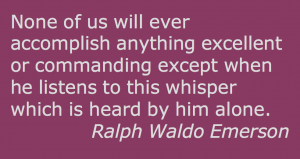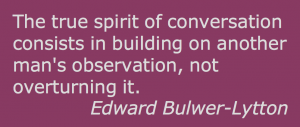How we work
The purpose of SlowTalk is to provide people with an experience of a conversation that goes further than just the spoken, rational word. Since the vast part of communication is non-verbal, SlowTalk allows each participant to feel the energy of delivery, the emotional emphasis, and the speaker’s intent.
SlowTalk takes place in a safe space, an environment where people can listen with an open mind and express honestly what they are thinking. The key for this to happen is
empathy
We listen with a genuine desire to understand.
Each SlowTalk event is unique since it depends on the contributions of those present during the conversation. Particular attention is paid to people receiving equal opportunities to speak, a comfortable speaking time, and focused attention. Of course, people are free to speak – or not to speak.
Unusual experiences – natural periods of  silence can occur. Such silent periods of reflection are an important feature of the SlowTalk design. People discover they can enter a different mindset. They have the time to think about what they want to share – or not – which can lead to deeper insights. It is unusual and powerful for a surprising number of people to feel the undivided attention of people listening to them.
silence can occur. Such silent periods of reflection are an important feature of the SlowTalk design. People discover they can enter a different mindset. They have the time to think about what they want to share – or not – which can lead to deeper insights. It is unusual and powerful for a surprising number of people to feel the undivided attention of people listening to them.
Misunderstandings are a natural phenomenon in life. They can indicate that one person has not yet (fully) understood what the other person said (or intended to say). This is more likely to occur when we try to express something new, when we seek solutions to something, and when
we innovate
 Instead of skipping over somebody’s contribution or ridiculing it, SlowTalk participants are encouraged to embrace the perspective of the speaker and help him or her articulate what they are trying to say. For most people, this is an unusual and delightful experience. This can happen naturally during the conversation or it may follow a spontaneous intervention or a planned exercise (by the facilitator).
Instead of skipping over somebody’s contribution or ridiculing it, SlowTalk participants are encouraged to embrace the perspective of the speaker and help him or her articulate what they are trying to say. For most people, this is an unusual and delightful experience. This can happen naturally during the conversation or it may follow a spontaneous intervention or a planned exercise (by the facilitator).
There will always be ample opportunity to reflect on the process of communication based on what has happened between participants. We learn this way – we learn about ourselves, our inner values that influence the way we communicate, and we learn to really hear others.
The first criterion of success in any human activity, the necessary preliminary, whether to scientific discovery or artistic vision, is intensity of attention, or, less pompously, love. – W.H. Auden

 D5 Creation
D5 Creation